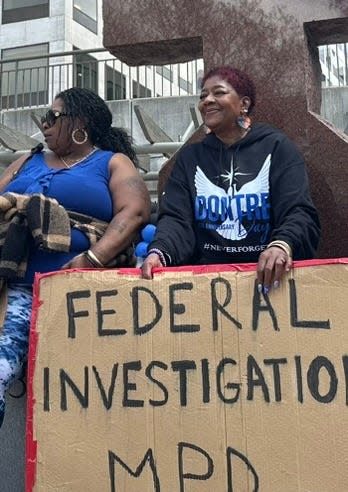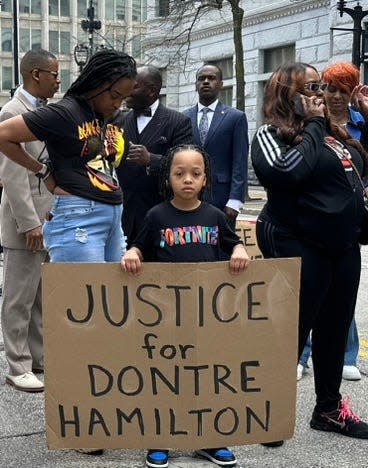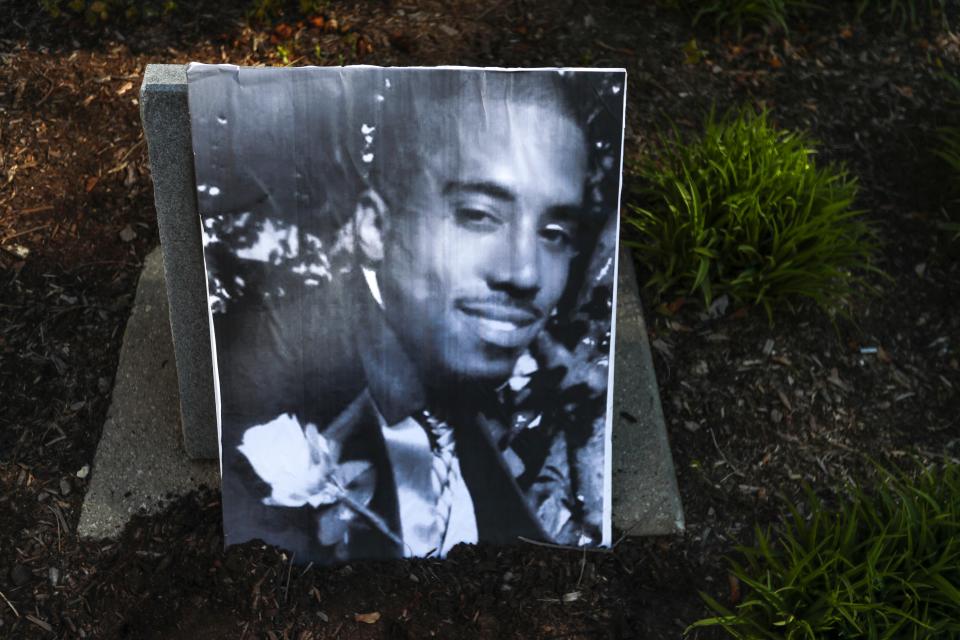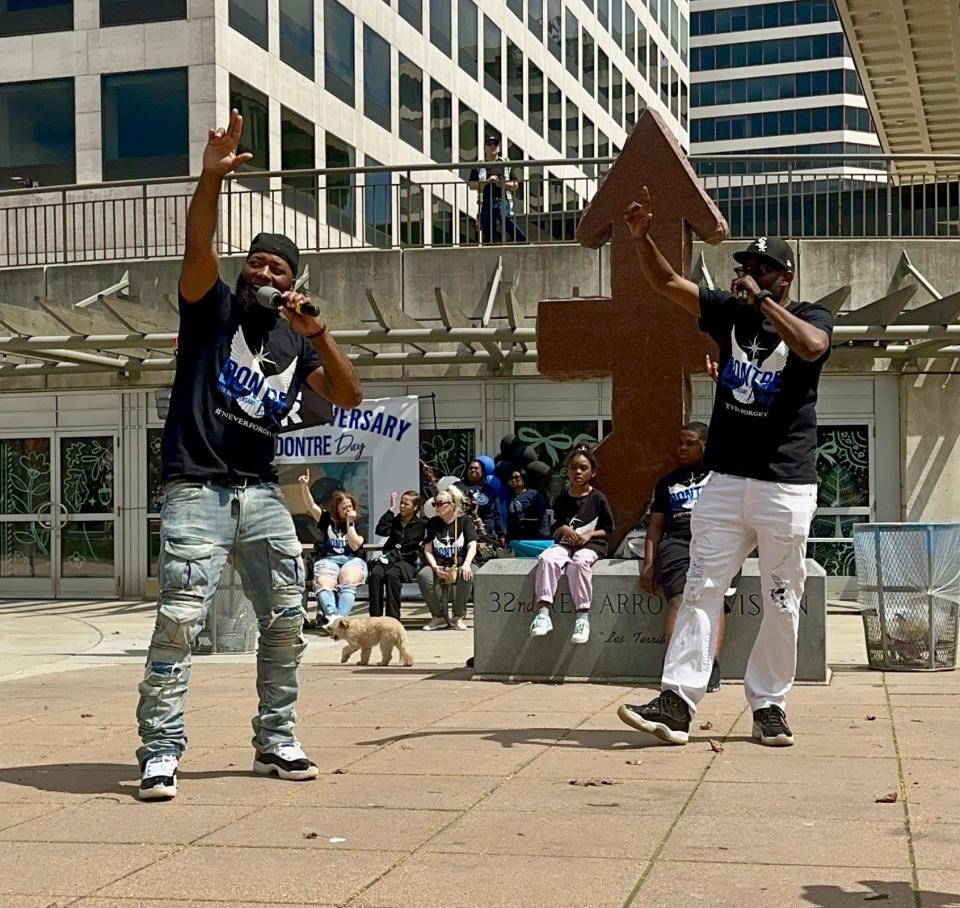Milwaukee police killed Dontre Hamilton 10 years ago. His family continues to push for change.
There are days that Maria Hamilton has trouble just getting out of bed, wracked by the trauma of losing her son a decade ago.
Dontre Hamilton, who lived with mental health challenges, was shot by a Milwaukee police officer in a downtown park, a fatal encounter that has since reverberated through the city and beyond.
Maria Hamilton and her family have been thrust to the forefront of what's become a movement to ensure her son's death never loses its meaning. It has prompted reforms, but too few in Maria Hamilton's opinion.

Away from the cameras and chanting crowds, Maria is still a mother who lost her child. On Saturday, she was joined by mothers from across the country whose children died in encounters with police.
"We've been a sorority that I never would have signed up for," she said. "We hold each other up in the morning, and we stand 10 toes on the ground together."
After leading a march from the federal courthouse to Red Arrow Park to mark "Dontre Day," Hamilton spoke just feet from where her 31-year-old son was awoken as he slept on a bench on April 30, 2014. A short time later, he was shot 14 times by Milwaukee police officer Christopher Manney, who was later fired but not criminally charged, something that still rankles the Hamilton family.
Manney wasn’t adequately trained in dealing with people who may be experiencing mental illness. Hamilton's family sued the city and settled the case for $2.3 million.

Manney’s use of deadly force was found to be justified by then-Police Chief Edward Flynn, but Flynn still fired him for violating rules on when to do a pat-down and how to approach people with mental illness.
The city is under court-ordered reform of its 'stop-and-frisk' policy following a lawsuit by the ACLU. Progress has been slow, according to studies in the past year. Milwaukee police still disproportionately search people of color in traffic and pedestrian stops and too often is doing so without justification

Milwaukee's officers now receive Crisis Interventional Training, a 40-hour course that teaches police how to identify and respond to a person struggling with mental illness.
The city also deploys Crisis Assessment Response Teams of officers and clinicians assigned to address mental health calls, defuse possible volatile encounters and connect people to other resources, rather than offering the standard law enforcement responses of citations and arrests.
Officers who are assigned body cameras must wear them at all times on duty. A 2018 study found Milwaukee police officers with body cameras made fewer stops and were less likely to receive a citizen complaint. When it comes to using force, however, it didn't matter if officers had cameras. They used force at roughly the same rates.
Maria Hamilton said she is disappointed that a new policy mandating the release of police body cam footage within 48 hours is being held up in the courts. She said it shows the police department still lacks transparency.
In a statement, the police department said it "has worked tirelessly to rebuild our community's trust and have made great strides... MPD believes that no one should cause harm to our community, and that includes our own. We hold our members to the highest professional standards and work hard to instill a culture of professionalism and community engagement."
There is now a memorial on the bench where Hamilton was shot.
The shooting 'catapulted me into activism'
On the day Hamilton was shot, Camila Ahmed happened to be riding by the scene on the bus on her way to work. At home later, she realized a Black man had been shot by a police officer. The event was pivotal for Ahmed. She was back at the park Saturday to testify to what that did to her.
“I felt very strongly that it was wrong, and Dontre Hamilton kind of catapulted me into activism,” Ahmed said. “That whole situation moves me to use my voice more, speak out more against police brutality in all forms."
Ahmed has worked alongside Maria Hamilton and Samaria Rice, whose son Tamir was killed by a Cleveland police officer in 2014 and was present at Saturday's event, to raise awareness about police shootings in the Milwaukee area. With two sons of her own, 10 and 13, Ahmed hopes that no other Black mothers would experience losing a child.
Nate Hamilton, Dontre's brother, said Saturday that when his brother died he felt like he was hit by "a wrecking ball." He credits his faith in God for helping him become a champion for change in his brother's name.

"I had to trust that God would give me something, and what he gave me was a family who continued to say, 'We need you to be that voice,'" he said. "I tried to make sure that I didn't allow myself, my own mindset, to get in the way, that, you know, it was bigger than me. My faith allowed me to see that."
Nate Hamilton said he wanted the day to be positive, not about the loss of his brother but of the changes that have happened — and will happen — in his memory, including helping mothers get mental health care in Milwaukee.
"The biggest thing I want people to know is, Dontre cared," he said. "He cared so much for his family and we want to give that love to this community, overwhelmingly. It's infectious and it rubs off on everyone else."
Asked what Dontre would think of Saturday's event, Nate paused and smiled.
"He had this saying, when it was something real good, he would say, 'yimy-yow!' That means it was all good. I think he would be saying yimy-yow right now."
This article originally appeared on Milwaukee Journal Sentinel: Dontre Hamilton was killed by a Milwaukee police a decade ago

